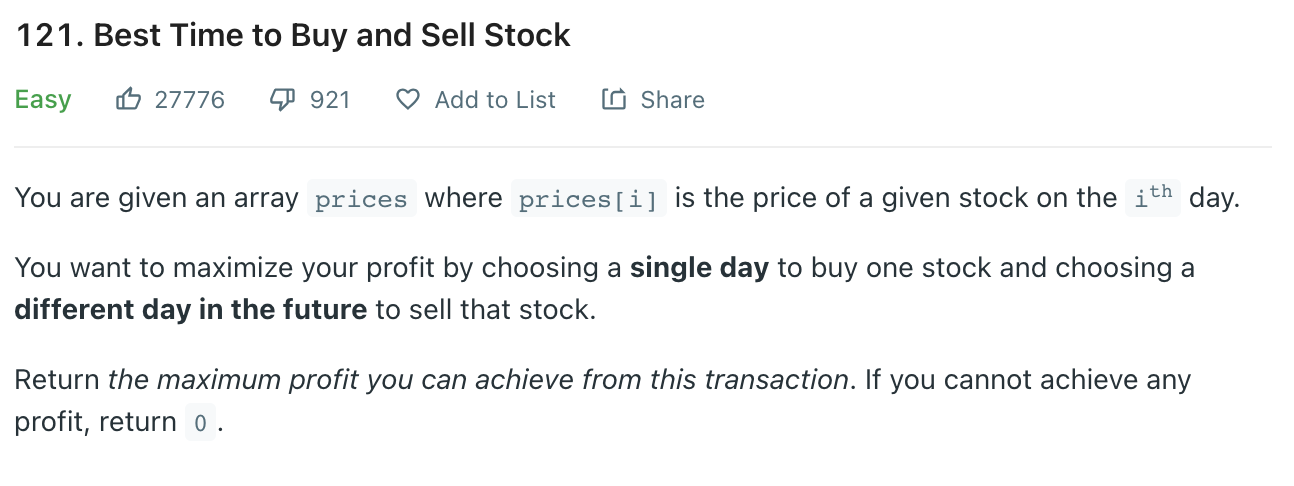

Best Time to Buy and Sell Stock - LeetCode
Can you solve this real interview question? Best Time to Buy and Sell Stock - You are given an array prices where prices[i] is the price of a given stock on the ith day. You want to maximize your profit by choosing a single day to buy one stock and choosin
leetcode.com
<로직 고민/>
- 일단 buy, sell, profit 이라는 변수를 생성하고, buy는 prices 배열의 첫 번째 값, sell과 profit은 0으로 초기화한다
- for문을 prices 인덱스 0부터 마지막 인덱스 전까지 돌린다
- 0번 인덱스 값부터 비교해서, 해당 값이 buy 값보다 작으면 buy에 해당 값을 넣는다(적은 돈으로 살 수록 이익이 크니까)
- 그렇게 수정된 buy 값과 다음 인덱스 값과 비교해서 buy보다 크면 sell에 다음 인덱스 값을 넣는다(산 값보다 판 값이 더 커야 이익이니까)
- 그 다음 profit과 sell - buy 연산의 값을 비교해서 sell - buy 연산 값이 더 크면 profit에 해당 값을 넣는다
- 다음 for문이 돌기 전, sell은 0으로 초기화 해준다(계속해서 바뀔지 모르는 buy 값과 비교해서 sell 값을 업데이트 해줘야 하기 때문)
<완성된 풀이/>
class Solution:
def maxProfit(self, prices: List[int]) -> int:
buy, sell, profit = prices[0], 0, 0
for i in range(len(prices)-1):
if prices[i] < buy:
buy = prices[i]
if buy < prices[i+1]:
sell = prices[i+1]
if profit < sell - buy:
profit = sell - buy
sell = 0
return profit
- 꽤 괜찮은 점수같긴 한데 시간복잡도를 조금 낮춰야 할 필요가 있어보인다
<다른 사람 풀이/>
- 천재풀이1
def maxProfit(self, prices: List[int]) -> int:
if not prices:
return 0
maxProfit = 0
minPurchase = prices[0]
for i in range(1, len(prices)):
maxProfit = max(maxProfit, prices[i] - minPurchase)
minPurchase = min(minPurchase, prices[i])
return maxProfit- 아 if문으로 할 게 아니라 max, min함수 썼으면 됐구나...!!
- 근데 max, min 쓰니까 실행시간이 더 걸린다
# 위 코드 보고 수정한 풀이
class Solution:
def maxProfit(self, prices: List[int]) -> int:
buy, sell, profit = prices[0], 0, 0
for i in range(len(prices)-1):
buy = min(prices[i], buy)
sell = max(prices[i+1], buy)
profit = max(profit, sell - buy)
sell = 0
return profit- 뭔가 보기엔 깔끔해 보여서 좋긴 한데...
